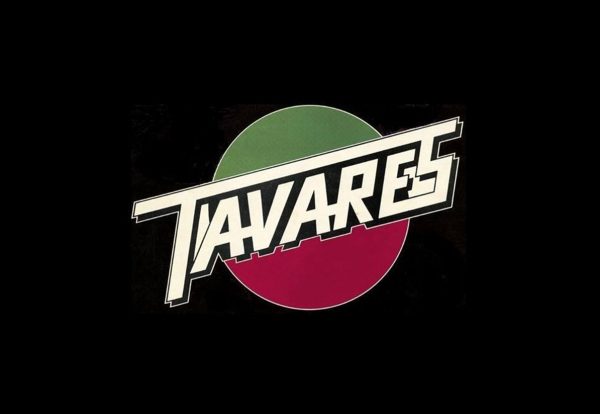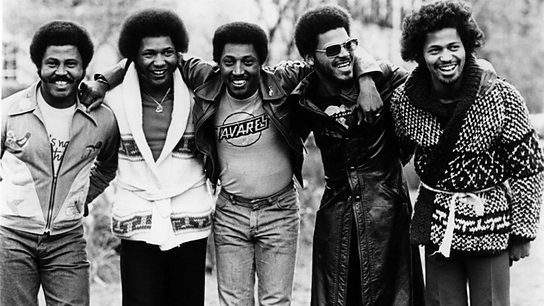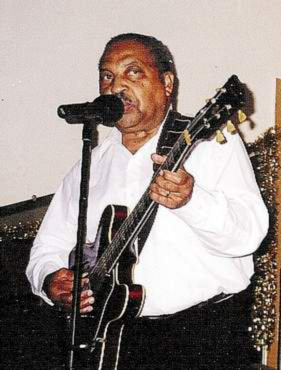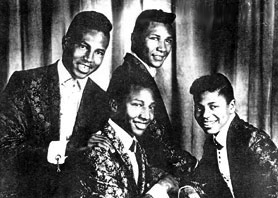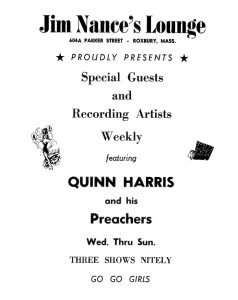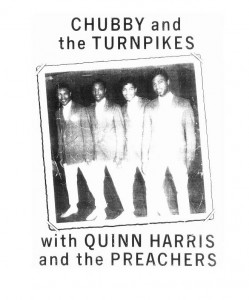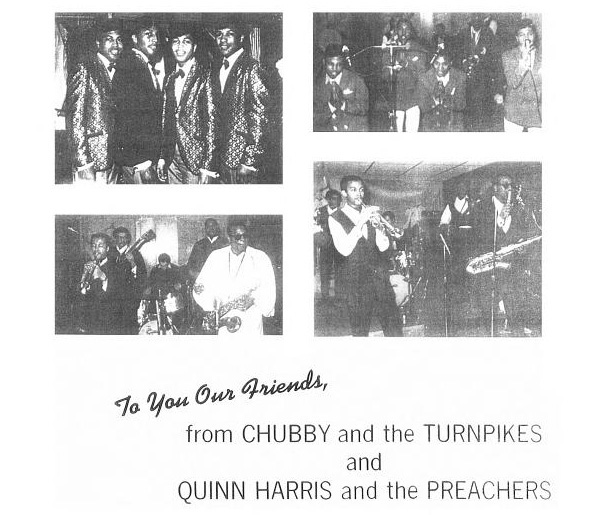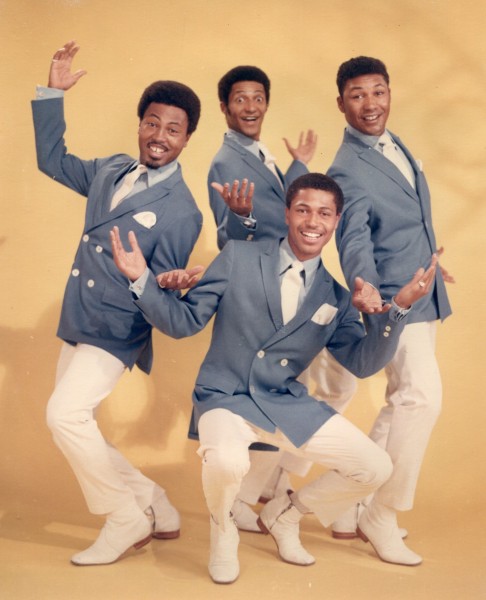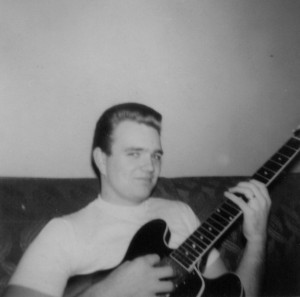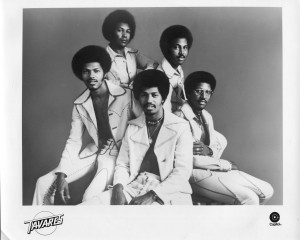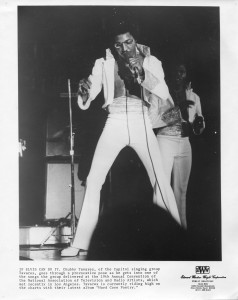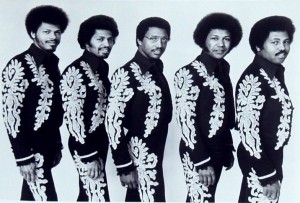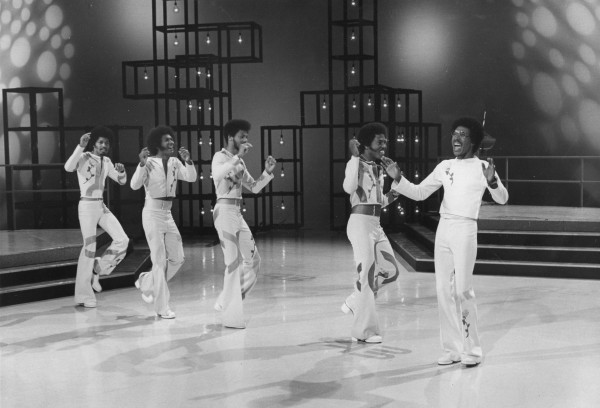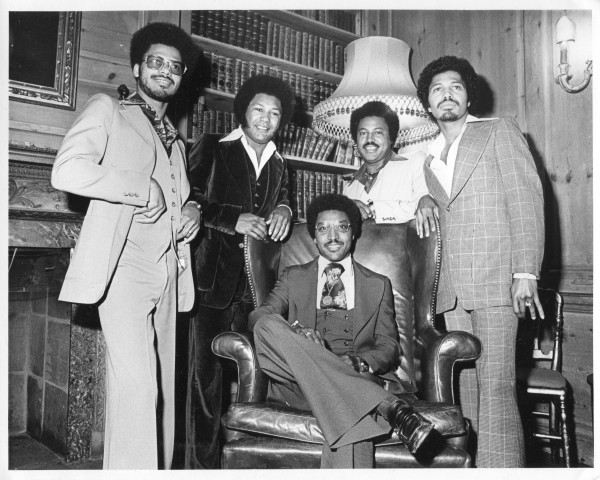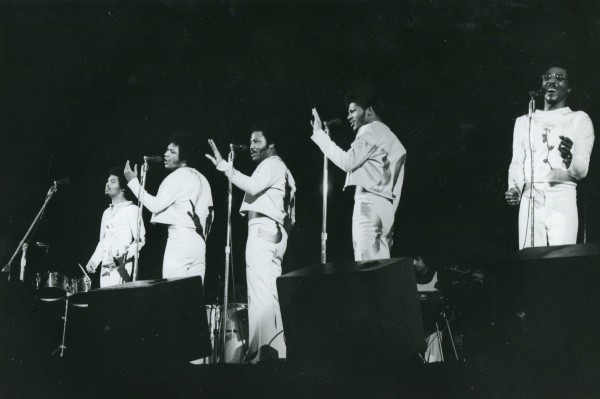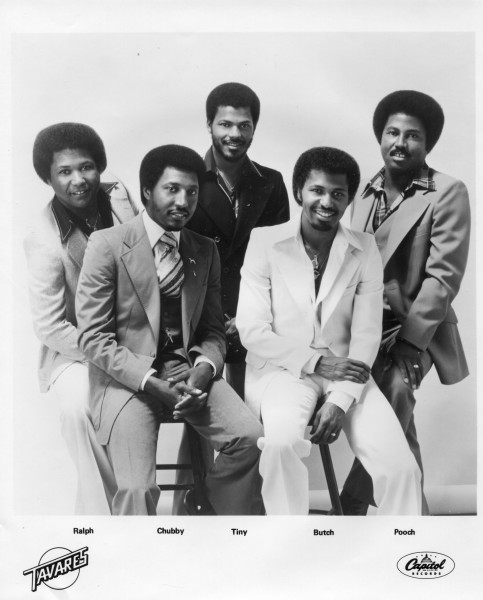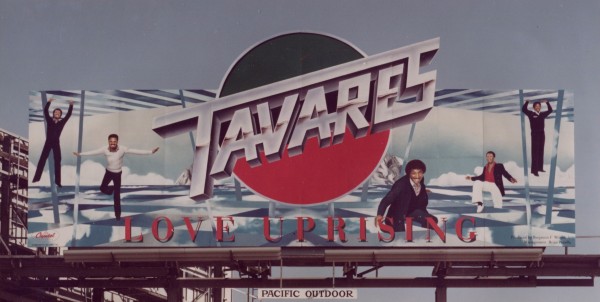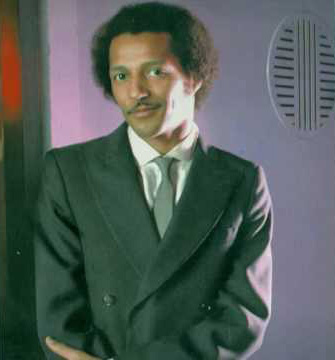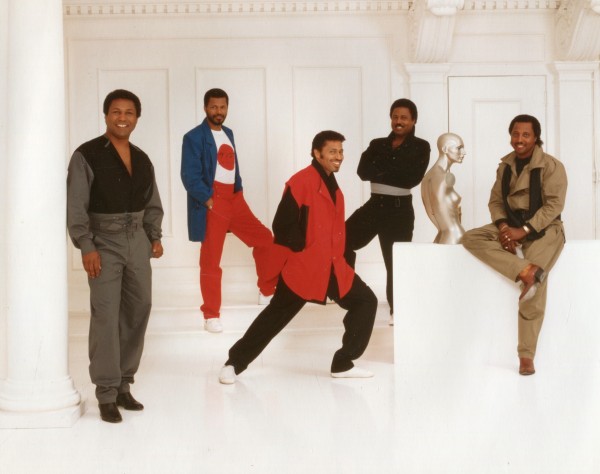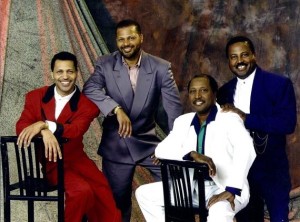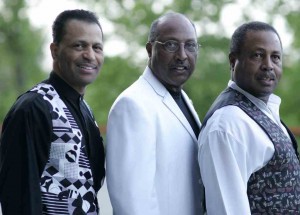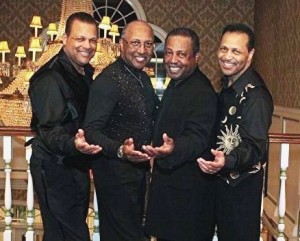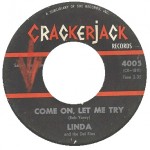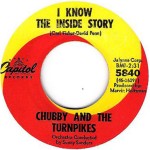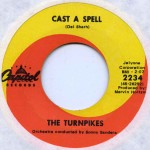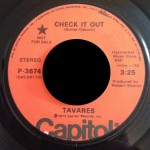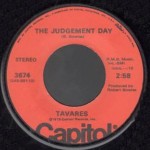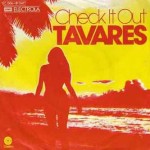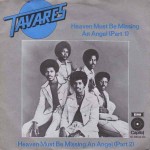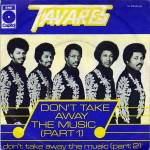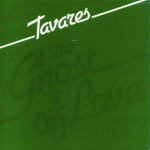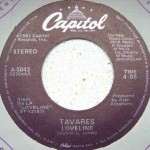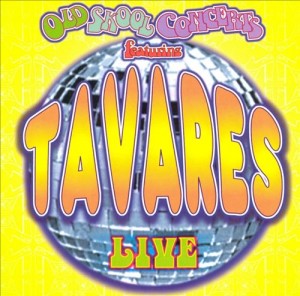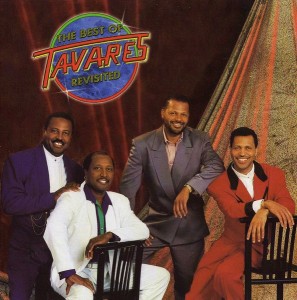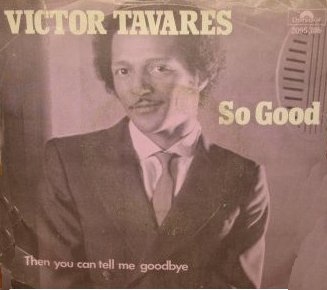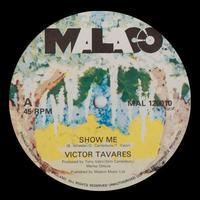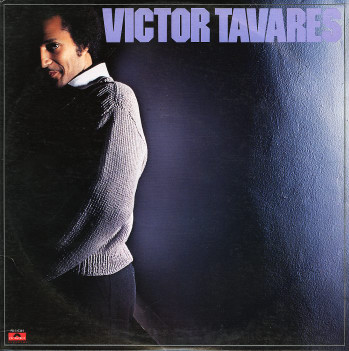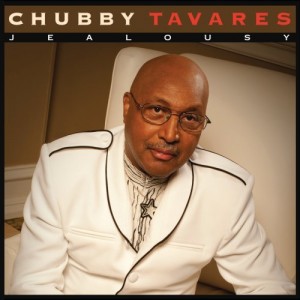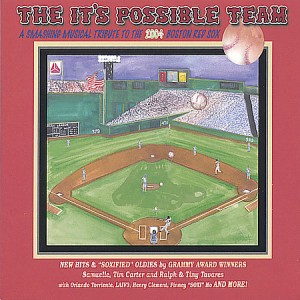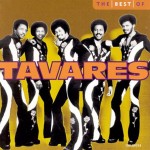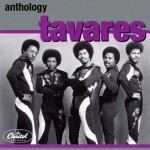Tavares/Chubby & The Turnpikes
2014 INDUCTEE
R&B
HARD CORE POETRY & STREET CORNER SYMPHONIES
The Story of
PREFACE
Street corners loom large in the history and legends of the rise of the American singing group in the Rock ’n’ Roll/Rhythm & Blues era. Down in New York City, Dion DiMucci and his gang staked their claim on Belmont Avenue in the Bronx. Out in Detroit, two rival groups, The Distants and The Primes battled it out nightly under the street lamps until they both cried “uncle” and merged to form The Temptations. Up in the North End of Providence, Peter Andreoli and Vini Poncia held court while their group, The Videls, serenaded the neighborhood.
And so it was on the South Side of Providence about fifty years ago when a police cruiser pulled up to a group of youths singing on the sidewalk on Willard Avenue. “Move along,” he said. The eldest among them spoke up, “But we live here.” “Oh, yeah?” “Yes, this our house – we live on the third floor.” “Well, I still need you to move it along.” The eldest tried to reason with him one more time. “But, we’re not doing anything – we’re just singing!” And that’s when the officer said, “Okay, get in the car,” and took them all down to headquarters on a charge of disturbing the peace! Little did he know that he had so rudely interrupted one of the earliest public performances by a group which a decade later would become one of the most successful singing groups of all time and known worldwide as simply “Tavares.”
The author would like to thank Ralph Tavares for his generosity and cooperation during the interview process and for opening up the family archive to the Rhode Island Music Hall of Fame. Special thanks also go out to Bob Bovi, an early friend and supporter, to Brian Panella, the group’s longtime manager, and to Tiny Tavares for filling in the gaps and shedding light on the hazier parts of the story.
INTRODUCTION
The story of Tavares is the inspirational tale of a band of young brothers bound not only by blood, prodigious talent, and a rich musical legacy, but by a fierce determination to succeed in the music business. For more than two decades, the Tavares brothers were in the thick of it with the best and biggest of them. Along the way, they managed to place 8 singles on Billboard’s Top 40, 12 singles on the R&B Top 10 chart (including three #1 records), 3 Dance Chart hits (1 at #3 and 2 at #1), 10 hit albums, and won a Grammy for their work on the soundtrack to Saturday Night Fever, one of the best-selling albums of all time (recently certified at 15 times Platinum). Tavares toured the world in tandem with their peers and as headliners and performed dozens of times on television guesting on every major variety, talk and music program of the 1970s and 1980s.
Not bad for “…a bunch of snot-nosed kids from Rhode Island,” as Tiny Tavares put it in an interview with The Providence Journal on the eve of their induction into the Cape Verdean Heritage Hall Of Fame in 2006.
And this is where the story begins – in Providence, Rhode Island. Although most resources refer to Tavares as a New Bedford, Massachusetts band and it is well known that the family lived in southeastern Massachusetts at different times, it is equally well known that they spent a great deal of their early years in the Fox Point and South Providence neighborhoods of Providence. Their family’s musical endeavors were based out of Fox Point and Tiny speaks with great fondness of his musical education at the Roger Williams Middle School in South Providence. One of the earliest known photos of the group shows six boys, all dressed in matching Fox Point Boys Club t-shirts. We proudly welcome Tavares as 2014 inductees into the Rhode Island Music Hall of Fame.
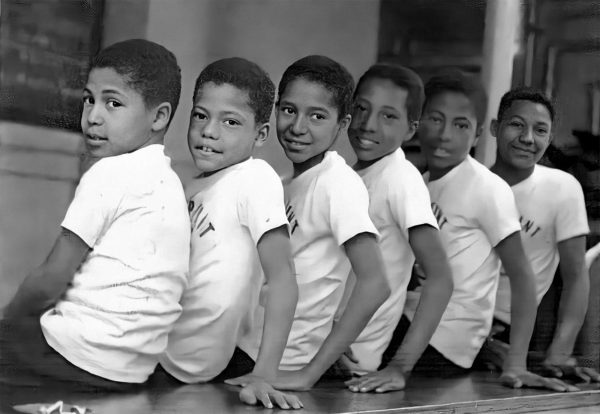
The brothers in the mid-1950s (left to right): Feliciano (Butch), Perry Lee (Tiny), Victor, Antone (Chubby), Arthur (Pooch) and Ralph Tavares
EARLY DAYS
The seven sons of Feliciano Tavares were born to their calling. John, Ralph, Arthur (nicknamed “Pooch”), Antone (known as “Chubby”), Victor, Feliciano Jr. (called “Butch”) and Perry Lee (as the youngest, dubbed “Tiny”) all received their earliest musical schooling right at home from their dad.
“Flash,” as he was known to the music community, was a singer and self-taught guitarist of great skill and talents. Growing up in the Fox Point neighborhood of Providence, he was immersed in the Cape Verdean and Portuguese musical traditions which had come flowing across the Atlantic in the early 20th century. Drought and poor economic conditions had caused a wave of immigration led by those seeking employment in the cranberry bogs on Cape Cod and on the fishing fleets out of New Bedford, Massachusetts and Galilee in Narragansett, Rhode Island. Thanks to the radio and the huge record collection he’d begun amassing, Flash also began to play jazz and popular songs. By the 1940s, he had created his own style combining traditional Cape Verdean melodies with modern rhythms and instruments – Americanizing the music while never losing sight of its roots. He became the guiding light of the Cape Verdean-American music scene in southern New England for the next six decades.
The boys’ mother, Albina Gomes, and their aunt, Flash’s sister Victoria “Vickie” Vierra, were also singers. Like her brother, Vickie had also developed an original sound singing Cape Verdean music with jazz stylings and worked with some of the top bands in New England including The Skyliners and Phil Barboza’s Latin Dance Band alongside the teenaged Chick Corea. Thanks to the older generation, there was always music around the Tavares household with the boys joining the adults in various combinations.
As they began to reach their teens, the brothers became attuned to the new, exciting sounds of Rhythm & Blues sweeping the nation and they began to work up their own close harmony vocal style. While Flash was open to most almost anything musical, his interest in R&B went no further than the funky jazz of Jimmy McGriff’s organ-driven quartet and he drew the line at Rock ’n’ Roll. And so, it fell to the oldest, John, to guide the boys in a new direction.
THE DEL RIOS
In the late 1950s, John formed a quintet which included Ralph, Chubby and Pooch and their cousin, Peter “Boo” Nicholaus. They called themselves The Del Rios. Singing the latest vocal group hits by such stars as The Moonglows, The Flamingos and The Five Keys, the act became a local sensation. They sometimes worked shows as a backing group for another Providence musician, singer Linda Steele. It was during one such show that they came to the attention of record producer Juggy Murray. Murray was the owner of Sue Records and had enjoyed hits in the late 1950s with the aforementioned Jimmy McGriff Quartet and was at that time riding high on the recent success of Ike and Tina Turner’s “A Fool In Love.” He liked what he heard and he offered Linda and the group a recording contract. They journeyed down to New York City in 1962 to record a single for Murray’s Crackerjack subsidiary. Either side, the up-tempo “Come On, Let Me Try” or “I Don’t Want To Be Loved,” a great ballad, could have been a contender for the top of the charts, but there was very little action at radio and the act was dropped from the label. The group gradually fell apart: Linda quit the business, Boo left to pursue a solo career, and John and Ralph moved to Connecticut taking jobs at the Pratt & Whitney aircraft factory in Hartford. Shortly after, Ralph enlisted in the Army.
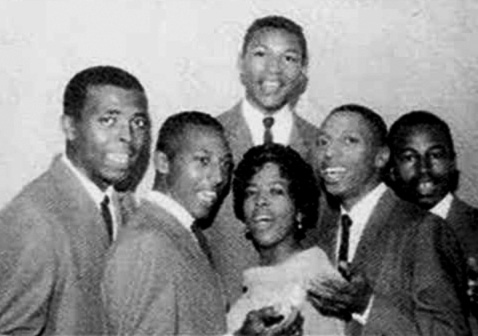
Linda & The Del Rios (left to right) Peter “Boo” Nicholaus, Chubby Tavares, Linda Steele, John Tavares, Pooch Tavares and (in back) Ralph Tavares
CHUBBY & THE REALITIES
On the home front, Chubby and Pooch formed a new group with their younger brother Butch which they called Chubby & The Realities. At first, as an underaged act, they could not perform in nightclubs and bars, but they quickly made a name for themselves on the New England teen scene playing high school and CYO (Catholic Youth Organization) dances, youth club sock hops and “Portuguese times” (heavily chaperoned mixers where “nice girls” could meet “nice boys”). Ralph became a paratrooper in the Army Airborne Division and wound up stationed at Fort Campbell which straddled the Kentucky/Tennessee border. On the weekends, he’d make his way up to Detroit, Michigan to see the up and coming acts at the famous 20 Grand nightclub, the proving grounds for most of Motown’s early stars. Watching performances by such acts as The Contours, The Marvelettes and The Four Tops, Ralph was certainly impressed, but was also making mental notes about the future. While he thought these groups were great, he felt that they were not doing anything that he and his brothers couldn’t do and that his family might even be able to do it better!
When Ralph was honorably discharged in 1964, he returned to New England and tracked down his brothers who were by now performing in nightclubs. He found them at The Blue Flame in Onset, Massachusetts. They were fronting a band, but making very little money. Although Butch was the star attraction, the band leader was not paying them accordingly. Ralph laid out a plan to take the group to the professional level and eventually seek a major label recording contract and convinced his brothers they could take things to the top. Ralph returned to the group.
CHUBBY & THE TURNPIKES
They began rehearsing with a vengeance and finding work at clubs which had house bands to back them. During one such engagement in 1967 opening for The O’Jays at Basin Street in Boston, they were accompanied by The Preachers, a band led by saxophonist Quinn Harris. Quinn was studying at the Berklee College of Music in Boston under the tutelage of Quincy Jones and was working clubs at night to support himself. The brothers hit it off with Quinn, his drummer Jim Atkins, and the young keyboard player in the band, a New England Conservatory student named Bernie Worrell, and they all decided to work together.
With their own backing band in place, they started performing in the nightclubs around New England and wound up working regularly over the next couple of years at Jim Nance’s Lounge, a club in Roxbury, Massachusetts owned by the Boston Patriots running back. The band would work 5-7 nights per week with Nance bringing in headliners on the weekends to be backed by The Preachers with the Tavares brothers opening the show.
The group had been saving money and purchased matching stage outfits and a passenger van which provided reliable transportation during their travels. During this time, they met a man named Norris Rutledge from Winston-Salem, North Carolina while playing at Pio’s Lounge in North Providence. Norris became their biggest supporter, their main man – the Bundini Brown to their Muhammad Ali. He drove the van, kept everyone on time and generally watched over the guys. With their new professional look and outlook, their reputation grew and they became one of the top acts in the Northeast. During this era, Atkins left the band and was replaced by Joey Kramer.
They began making forays into New York City, knocking on doors, looking for opportunities. During a visit in 1967 to The Brill Building in Manhattan’s “Tin Pan Alley” (the heart of the East Coast music business), they ran into Marvin Holzman. Marv had been a studio musician and record producer since the 1950s, most notably working with Brook Benton and Marcie Blane of “Bobby’s Girl” fame. He auditioned them and, soon after, called them back to New York for a recording session. They cut two sides which Holzman shopped around before placing the single with Capitol Records. Before releasing the record, the label questioned the relevance of their Realities group name and ultimately decided it was too old-fashioned sounding. They rechristened the group with a name that would invoke the exciting mood then enveloping the youth of America. They were named after the fast, modern interstate road system which was still being put in place under President Eisenhower’s Highway Act of 1956: Chubby & The Turnpikes.
The group took it in stride and their fans didn’t miss a beat – the name change became official and they began billing themselves as Chubby & The Turnpikes while awaiting the record’s release. When it finally came out in 1968, “I Know The Inside Story” was big news in southern New England. The record was played all over the Northeast and sales were brisk. The attendance at their shows grew exponentially and they began making regular local television appearances and opening concerts for many of the big stars coming through the area. But even with the giant Capitol Records machine behind them, the record did not become the national hit all had hoped it would be.
(“I Know The Inside Story” b/w “I Didn’t Try” is considered one of the finest Northern Soul records ever made. It has never been reissued and a copy in good condition can fetch up to $300.00 on the collectors market.)
Around this time, Ralph was able to place Chubby & The Turnpikes with a major talent agency. He’d gotten an appointment in New York City at The Bowen Agency, Ltd., run by Ruth Bowen, the first African-American woman to start up a booking agency. She knew talent when she saw it – she’d discovered Tommy Hunt – and she took on the group. She kicked the quality of their bookings up a notch and soon had them appearing in such high profile settings as opening act for Ike & Tina Turner at the Boston Arena.
Street corners again loom large for the brothers at this point in this “inside story” from around 1968. It was another curbside performance which would set the stage for their eventual success and stardom and introduced them to a man who would also loom large in their career in the coming years. Bob Bovi, a well-known Rhode Island musician, booking agent and owner of Bovi’s Discount Music in downtown Providence recalls the incident:
“Chubby, Butch, Pooch, Victor, Ralph and Tiny were friends and regular customers at my store. They’d had ‘I Know The Inside Story’ on Capitol which I’d thought was very good. I asked them what the company was doing for them and they said, ‘Not much.’ I told them I might be able to help. I spoke with a good friend of mine, Brian Panella, who was Capitol’s sales rep for southern New England and explained what was happening. He was interested in meeting with the group and we set up an appointment for the following week. Brian was on time, the guys were not. One of their friends happened to be in my store and I sent him out looking for them – he found them at the Weybosset Street Pool Hall. Soon after, a Chevy Chevelle Super Sport pulled up in front of the store and the boys started piling out along with their entourage. Brian asked, ‘How many are there?’ and I answered, ‘Just five or six in the group!’ I set up some speakers and played ‘Inside Story’ and the guys sang along and did their choreography. Brian’s eyes lit up and he said, ‘This group is going to be BIG!’ I asked, ‘When?’”
Brian asked Bob what part he’d be playing in the group’s next move, but Bob told him he was too busy to get involved at that level and Brian filed away the meeting for future use.
(The group referred to this event several years later during an appearance on The Tonight Show. Johnny Carson asked the group about their first big break and they told him that “…a kid in a music store in downtown Providence introduced us to a friend of his from Capitol Records who became our manager.”)
Brian recalls the incident just slightly differently, but the outcome is the same. Panella says that the reason he was trying to find the group was that Capitol needed to set up their royalty account in case “Inside Story” started to sell, but that Marv Holzman did not know how to reach them. As the Rhode Island rep, he’d been asked to track them down and Bob helped him out by setting up the meeting at his store. As a sales rep, Brian was not in a position to help advocate for them at Capitol, but after meeting them, he assured the guys that they were on the right track and would eventually make it big. Ralph and Brian stayed in touch and Brian began keeping tabs on their progress.
THE TURNPIKES
When it was time to cut their next single, they brought their brother Victor on board and the quintet, again under the direction of Marv Holzman, cut another terrific slice of Northern Soul, “Cast A Spell” b/w “Nothing But Promises.” The record came out in 1969 and this time, the group and the label went a step further and released the it under an even sleeker name – The Turnpikes. Again, the record did well in their home territory, but failed to break nationally and Capitol did not pick up their option for further releases. (This record is also considered a collector’s item and brings in up to $200.00 in an auction setting.)
At this time, Bernie Worrell graduated from the Conservatory and left the band to become musical director for George Clinton. He’d met George when The Preachers had backed The Parliaments in Boston a couple of years earlier. George had since formed his own backing band, Funkadelic. Bernie would go on to stardom leading this gang of Funk pioneers as they evolved into Parliament/Funkadelic. In his autobiography “From Funky Blues To Good News,” Quinn states that so great were Worrell’s talents (which included perfect pitch and kicking bass on his organ pedals) that it took three musicians to replace him! The band brought in bassist Richard Reed, Bobby Atkins on trumpet, and another Berklee student, Robert Bowles, on guitar. Bowles was such a soulful player that Quinn said of him, “Bobby Bowles was of the Caucasian race in name only.”
As their popularity in and around New England had not diminished and was, in fact, still growing, the group was not discouraged by the turn of events with Capitol and took advantage of the plentiful work opportunities while planning their next move. The Turnpikes brought their youngest brother, Tiny, on board and the new sextet along with their backing musicians began polishing their act into a “show band”, ready-made for all the best places on that blossoming scene. (During high school, Tiny had been singing in a group with Jeffrey Osborne. Soon after Tiny joined The Turnpikes, Jeffrey moved out to California to join his brother Billy where they would launch their own national career with their band LTD.)
Between 1969 and 1971, band members came and went. Bobby Bowles left the group to become a studio musician, Quinn Harris had graduated and returned home to California, and Joey Kramer had left to become a founding member of Aerosmith. The group picked up two important additions to the lineup at this time from The Blue Notes. Guitarist Hank Smith became their musical director. George Grey became their road manager, valet and stylist; he kept everyone looking sharp, matching the stage wear to the venue.
When their new act was polished, they approached Associated Booking Corporation, one of the oldest and most prestigious agencies in the country. The group’s reputation as one of the best and most entertaining groups in the Northeast had preceded them and the band was soon out on the road performing in casinos and resorts and on cruises.
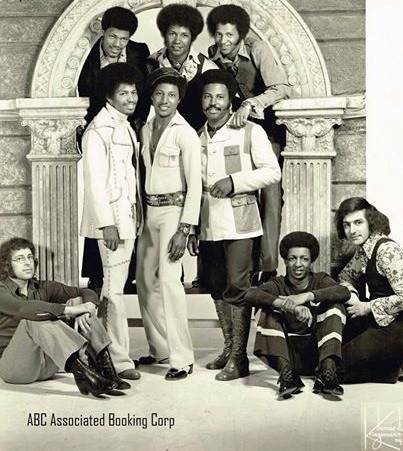
Associated Booking Corporation 8 x 10 glossy from The Turnpikes promo package. Back Row: Tiny, Ralph & Victor. Front Row: Butch, Chubby & Pooch. Seated at left is their Australian drummer Tony Gaher. At right are bassist Antone Rose from New Bedford and the group’s English percussionist.
Their repertoire was a virtual history of singing group music encompassing everything from the post-war 1940s sounds of The Four Aces, to the R&B and doo-wop hits of the ‘50s to the new sounds coming out of Motown and Philadelphia in the ‘60s.
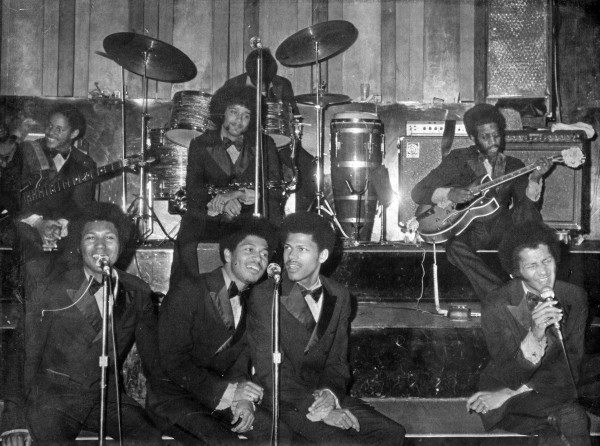
Giving the Rat Pack a run for its money: In the early ’70s, The Turnpikes were considered one of the finest show bands in the country performing at high end supper clubs, casinos and resorts. In front: Ralph, Butch Tiny & Chubby. Center row: bassist Claude “Puddin'” Bell, saxophonist Leroy “Country” Gomes & guitarist/musical director Hank Smith. In the back with head down is drummer John Cleckly
The next few years were busy and exciting with a full calendar of lucrative engagements all over North America and Europe. During a booking at a resort in Puerto Rico, the group met Lola Falana, an up and coming entertainer who’d been making waves on television and as part of Sammy Davis, Jr.’s package show. (She was performing in “the big room” – they were in the lounge!) A romance developed between Ms. Falana and Butch Tavares and ABC began setting up package tours for the two acts. (The couple were married in 1971 and divorced in 1975.) It was during an appearance on the Italian Riviera (where Lola was a big star thanks to her appearances in several “spaghetti” westerns) that the group made the next big decision about their future.
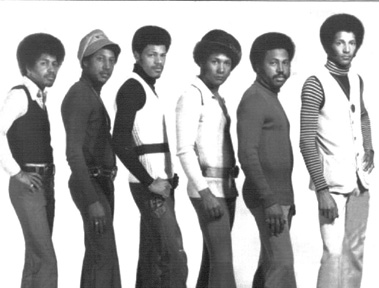
The six member lineup around the time of the name change from The Turnpikes to Tavares in the early 1970s (left to right): Butch, Chubby, Tiny, Ralph, Pooch & Victor
The agent at the resort came to Ralph and asked about the group’s name, “Turnpikes.” He wanted to know what it meant. When Ralph explained it was the American term for a highway, he was told that the term meant nothing in Italy or, for that matter, anywhere else in Europe. He suggested that a good name for the group might be their own. After thinking it over, Ralph brought the idea to his brothers and they all agreed that it might be for the best if they just changed their name to “Tavares.”
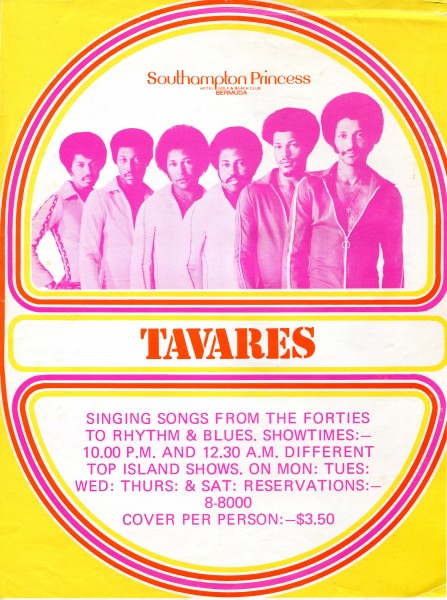
Poster for just one of the hundreds of lucrative engagements the group performed in the period between their Capitol Records contracts
TAVARES
In the early 1970s, life was good for the young brothers. They were doing what they loved to do and being paid very well to do it. But, the ever-elusive record deal was always dangling like a carrot in front of their eyes. Opportunity came knocking in the form of two old friends, Brian Panella and Bobby Bowles.
Panella had left Capitol Records in 1969 and formed a management company to look after the affairs of Peggy Lee. Lee was still a major concert draw around the world and still recording for Capitol Records so Brian was able to maintain his contacts at the label. In 1972, Lee acrimoniously parted ways with both Capitol and Panella over their handling of her then-current album. Brian had been keeping an eye on Tavares as they climbed the ladder of success and without a major client on his roster, he got in touch to offer the group his management services.
Ralph told him that they’d just cut a session for their old guitarist, Bobby Bowles, and Brian asked to hear the tape.
Bobby had become widely known in the industry as “Boogie” Bowles, working as a studio guitarist and producer and had become the musical director for Jerry Butler. In the early 1970s, Butler became a partner in the Mark XVI recording studio in Memphis, Tennessee, and had put Boogie in charge of production. He had written some songs and needed an artist to sing them so he called Ralph. Ralph sent him a tape of a recent live Turnpikes show which verified they were on the same page musically and it included a song Boogie loved called, “Check It Out.” They had found the song on the B-side of “I Need You, a recent hit by The Friends Of Distinction who had performed it uptempo. The guys had slowed it down to a ballad and given it the distinctive Tavares touch.
They were on their way to Florida to make a connection to head out to a booking at The King’s Inn in Freeport in the Bahamas so plans were made to stop in Memphis while en route for a recording session. Awaiting their arrival, Boogie prepared four tracks for them, “Check It Out” and three of his own songs. Boogie had been planning to cut Chubby as lead vocalist on the song, but he was not with them when they arrived. They explained that there had been a tragic incident back in New England where their sister Eva had been murdered and Chubby had been shot several times while trying to protect her from her assailant. Boogie assigned Victor to the lead on “Check It Out” and basics for that track as well as the other three were completed in a two-day session. (Chubby recovered from his injuries and rejoined his brothers several weeks later.)
Ralph sent the demo tape to Brian who loved it. He took it to Motown, but had no luck there. He next brought it to his friend Al Coury, Vice President at Capitol. The label had just started up a new R&B department so Coury brought in department head Larkin Arnold to listen. The two men agreed the group was something special. Next, Brian made arrangements for Arnold and another R&B exec, Varnell Johnson, to check out their act during an engagement at Toronto, Canada’s legendary showroom, Le Coq d’Or Tavern. They were just as knocked out by their live performance. They signed the group to their second Capitol Records contract and gave Boogie a budget to polish the recordings for release.
Two songs from the sessions were chosen as the first Tavares single: “Check It Out” and “The Judgement Day.” The single took off like a rocket! It reached #5 on Billboard’s R&B chart and cracked the Top 40 landing at #35.
(The B-side, “The Judgement Day,” has never been reissued on LP or CD nor as a download. It is probably their rarest track and is only found on original pressings of the 45. As of 2014, Cherry Red Records of the UK is in the process of remastering the Tavares catalog for reissue and it is assumed that when they work on the first album, they will include “Judgement Day” on the expanded edition along with the other two unreleased sides from the Boogie Bowles sessions.)
Ironically, after all the years of working toward this moment, the group lost a member. Based on the public reaction to his vocal on “Check It Out,” Victor decided to leave the act to pursue a solo career. The suits at Capitol were not worried – they still had a group with five lead singers who could sing close harmonies like only brothers can. Another irony here is that while the group was attending a press party to celebrate the success of the song, in walked an old friend of theirs from Providence, Billy Osborne. When they asked him what he was doing there, he told them he’d stopped in to thank them for recording his song! It turned out that Billy had composed “Check It Out,” but the group had never realized it was him. (One good reason for the oversight was that Billy’s name was misspelled on the Friends of Distinction 45 as “Osborn” without an “e” at the end and the error had been carried over to the label copy on the Tavares 45.)
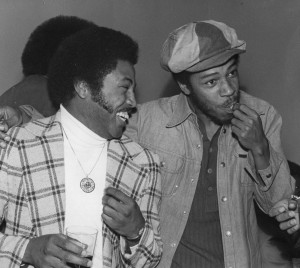
Pooch and Billy Osborne at the press reception celebrating the success of “Check It Out.” Until he showed up at the party, the brothers had not realized their old friend from Providence had written their hit!
Plans were quickly put in place to cut an album, but Bowles was in the middle of recording a duets album for Jerry Butler and Brenda Lee Eager. Capitol was in too much of a hurry to wait and they passed him over, pairing the group up with another producer. Johnny Bristol had been a major figure at Motown during their 1960s heyday working with Diana Ross & The Supremes, Gladys Knight & The Pips and just about every other star at the label. In 1973, he had just left Motown to start his own independent production company and pursue a solo career as an artist. He took on Tavares as his first client and completed the album in short order tacking on “Check It Out” as its title song and calling card. The album was released in January, 1974. A second single was chosen from these sessions, Bristol’s “That’s The Sound That Lonely Makes,” and it shot up to #10 R&B.
C’MON AND TAKE A FREE RIDE
It’s said that in show business timing is everything. In the case of Tavares, the timing was perfect!
By 1974, several important musical and sociological developments had coalesced into a new, exciting era for popular music. In the early 1970s, the crossover potential for R&B hits was increasing due to the willingness of Top 40 programmers to add these records to their playlists, many times due to popular demand. In 1971, Billboard’s Top 40 for the year included only eight R&B titles. In 1972, that number nearly doubled with fifteen titles and held steady for the next two years at thirteen for ’73 and fourteen in ’74. Another factor was the public’s demand for more danceable music. Not since the Twist era of the early ’60s had the radio waves been so full of outright dance records. Among the breakout sounds leading the way were Joe Tex’s “I Gotcha,” Billy Preston’s “Outa-Space” and “Back Stabbers” by The O’Jays in 1972; The Isley Brothers’ “That Lady,” former Temptation Eddie Kendricks’ “Keep On Truckin’ (Part 1)” and The O’Jays again with “Love Train” in 1973 (the year of “Check It Out”); and 1974, the year things exploded for Tavares, gave us Barry White’s Love Unlimited Orchestra with “Love’s Theme,” MFSB locking in the Philadelphia sound with “TSOP,” Kool & The Gang’s “Jungle Boogie,” Kendricks repeating with “Boogie Down,” and, most importantly, “Rock Your Baby” by George McCrae.
“Rock Your Baby” and another record from the same year, “Rock The Boat” by The Hues Corporation, are historically regarded as the first two “Disco” records. The important thing to note here is that while popular music has always gone through “dance craze” phases, the records leading up to the codification of a style have all been songs of great substance and artistic merit whose linking factor just happened to be a renewed concentration on beat and danceability. There have always been novelty cash-in records and “bubble gum” interpretations associated with every major dance style throughout history and the same was true of Disco. But, by far, the bulk of the songs now associated in hindsight with the period are truly great R&B, Rock ’n’ Roll, Latin and Pop records which stand the test of time.
And so it was when Tavares burst onto the scene in 1973. They were in the right place at the right time and had the talent and drive to deliver the goods. Their deep R&B roots, incomparable harmonies, stellar production and, most importantly, incredible song choices set them on a five year journey to the top unparalleled in Rhode Island music history.
HARD CORE POETRY IN THE CITY
Johnny Bristol had not anticipated the demand when he began offering his services as an independent producer and due to his super-busy schedule, he could not go any further with Tavares. It was decided the group would enlist the songwriting/production team of Lambert & Potter.
Dennis Lambert of Brooklyn, New York, and Brian Potter of Essex, Englad, were both up and coming songwriters when they formed a partnership in 1969. They rose rapidly to the top working as writers and/or producers for a wide-range of major stars in several genres including The Grass Roots, The Four Tops, Skeeter Davis, Jerry Butler and Hamilton, Joe Frank & Reynolds – talk about crossover potential! They were also known to the brothers as they had contributed two songs to the first Tavares album and they were brought in to take the helm for the next two album projects. They supplied three major hits for 1974’s “Hard Core Poetry” album: their own “Too Late,” which reached R&B #10, and “Remember What I Told You To Forget“ which hit #4, as well as “She’s Gone” by the little-known Philadelphia singer-songwriter duo Hall & Oates. The song had been the single from the duo’s second album, “Abandoned Luncheonette,” but was not a major hit with the exception of heavy sales and airplay in their hometown. “She’s Gone” became Tavares’ first number one record. (Hall & Oates finally had a hit with the song – Billboard Hot 100 #7 – when it was re-issued following the success of the Tavares version.)
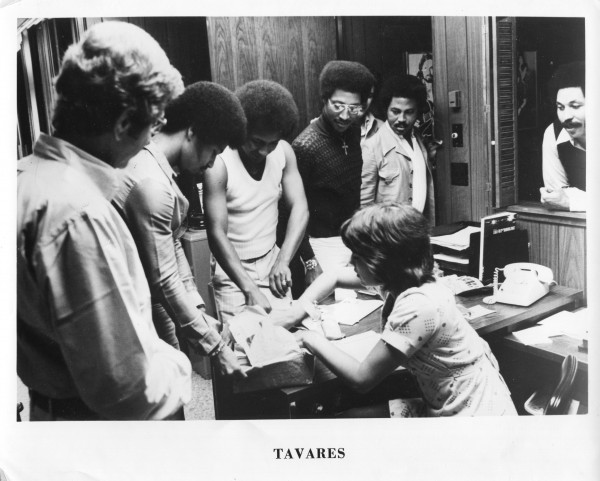
In these promotional photos, the guys are shown eagerly tearing into a package which held a stack of …
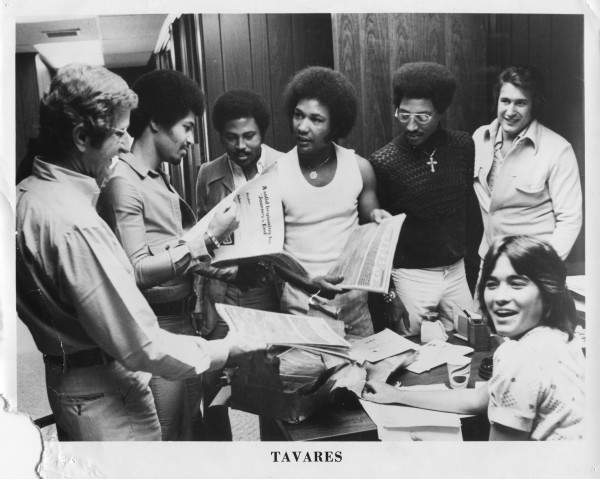
…the latest issue of “Cashbox” which contained an ad from Capitol Records congratulating them on “She’s Gone” reaching number one. Their manager, Brian Panella, proudly looks on at right.
The followup album, 1975’s “In The City,” fared just as well with three huge hits: “It Only Takes A Minute” (#1 R&B, #10 Hot 100 and #2 on the Dance chart as the group’s first 12” extended Dance Mix), “The Love I Never Had” (#11 R&B) and an incredibly energetic R&B interpretation of the Edgar Winter Group’s recent hit “Free Ride” (R&B #8).
A whirlwind might be only way to describe this period for the boys from Fox Point. They began a five-year period of non-stop television and concert appearances, circling the globe as headliners and co-headliners with the era’s biggest stars. The brothers did not mind the workload a bit! After all, this era was the payoff for all their years of hard work and preparation and all their dreams were coming true. But just when they thought it couldn’t get any better, things went through the roof! Enter Freddie Perren.
SKY HIGH!
Freddie Perren (“F.P.” to the Tavares brothers) was already a music business legend by the time he was thirty years old. He and his songwriting partners, Alphonso “Fonce” Mizell and Dennis “Deke Richards” Lussier, were just beginning to make waves on the scene when they were invited in 1969 to form a brain trust/partnership with Berry Gordy, Jr. at Motown to compose and produce under the umbrella name “The Corporation.”
(This concept came about with Gordy’s desire to anonymize the participants in the creative process at the label after the defection of the songwriting/production team Holland-Dozier-Holland. The trio had left Motown after unsuccessfully arguing for higher royalties by reasoning that having their names attached to a record amounted to a “brand” and virtually guaranteed airplay. Their next venture, Invictus Records, became one of the most successful R&B labels of the 1970s kicking off with Freda Payne’s “Band Of Gold” and The Chairmen Of The Board’s “Give Me Just A Little More Time.”)
The Corporation’s first task was to take over the direction of The Jackson 5. A record-breaking string of hits followed and Michael Jackson and his brothers became one of the biggest acts in the history of show business. They next worked their magic on The Miracles, revitalizing their sound for the Disco trend after the departure of lead vocalist and songwriter Smokey Robinson.
In 1976, Perren left Motown to join his Howard College friend Larkin Arnold at Capitol Records. His first assignment was Tavares. Released in 1976, “Sky High” cemented the group’s reputation as not only bonafide soul and pop superstars, but as the number one Disco act in the country. It showcased two enormous hits, “Heaven Must Be Missing An Angel” (#15 Hot 100, #3 R&B) and “Don’t Take Away The Music” (#34 Hot 100, #15 R&B). Both singles were released as 12” extended dance mixes and went all the way to #1 on Billboard’s Dance chart.
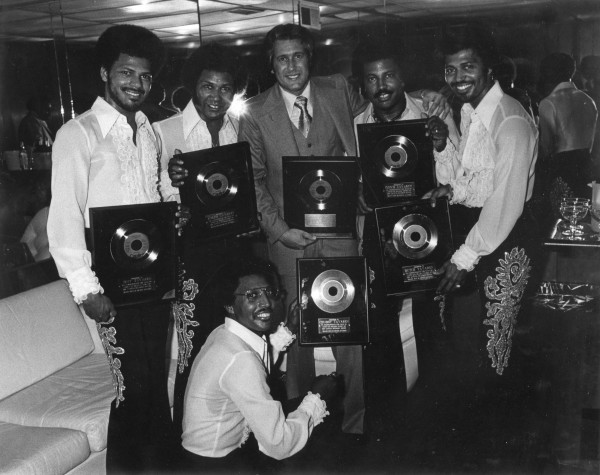
Tavares and Brian Panella receiving their RIAA Gold Record awards for “Heaven Must Be Missing An Angel”
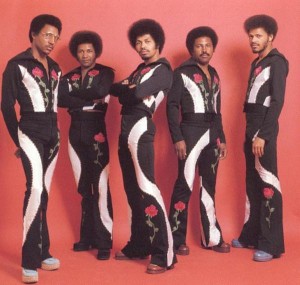
Sharp-dressed men: Tavares (seen here and in the photo below) in the mid-1970s at the height of the Disco era in two of their trademark matching stage outfits
For their live act, Tavares brought back their old friend Quinn Harris who’d been their musical director back in the Boston days. They were on the way to El Salvador and a couple of guys dropped out of the band just hours before their flight. A bit of quick thinking on Ralph’s part and a ticket waiting for Quinn at LAX brought him back into the fold. Tavares had become widely known as one of the finest and most energetic acts in all of show business, but Quinn helped raise the level of their live performances up to even greater heights. As other musicians were needed, the brothers always looked to their original circle of friends and over the next few years they brought in many of the finest players on the New England scene including trumpeter Ted Collins, bassist Bill Miele and drummer Jackie Santos.
“Love Storm” followed in 1977 and produced two more smashes, “Whodunit (Who Done It?)” (#1 R&B, #22 Hot 100) and a beautiful cover of Jesse Belvin’s 1956 hit “Goodnight My Love” which harkened back to the group’s earliest street corner days as The Del Rios under oldest brother John’s leadership.
The same year, the group was asked to participate in the soundtrack to Saturday Night Fever, a movie about the Brooklyn disco/dance scene starring John Travolta. The score was being composed and supervised by The Bee Gees. The Australian brother team of Barry, Maurice and Robin Gibb had made a successful transition from soft rock stars in the ’60s to dance music superstars in the early ‘70s with “Jive Talkin’,” “Nights On Broadway” and a string of other massive hits. They gave FP and the Tavares brothers a song called “More Than A Woman” which they produced themselves at Capitol and turned over to the Gibbs and RSO Records for the soundtrack. When it was released in 1978, the movie was a huge success with Travolta winning an Oscar for Best Actor, but the soundtrack took on a life of its own! In its initial run, the double album sold eight million copies and has since been certified by the RIAA as fifteen times Platinum. By the time the smoke had cleared, Tavares and FP were honored with Grammy Awards when the soundtrack won the 1978 Album of the Year award.
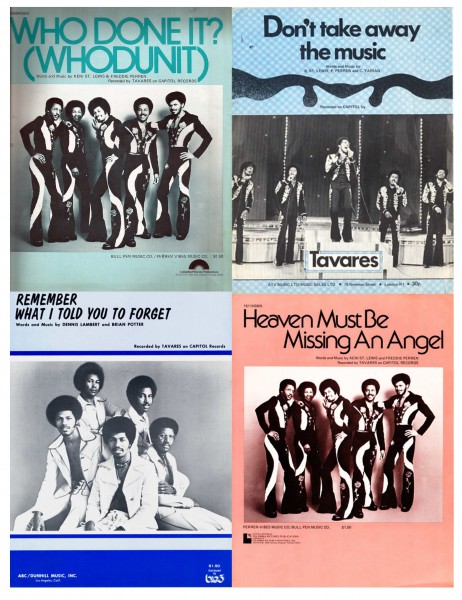
At the height of their career, Tavares was one of the most heavily covered bands of the Disco era and sold tens of thousands of copies of their sheet music to club bands and budding musicians all over the world
Capitol Records had rush-released a “Best of Tavares” album in late 1977 when the hoop-la surrounding the picture had begun to pick up steam and it became the best-selling LP of their career. The followup album in 1978, and their last with Freddie Perren, was “Future Bound.” “More Than A Woman” was included on the album and released as a single, but stalled in the thirties on both the pop and R&B charts. One simple explanation for this is that no one needed to buy the single – just about everyone in the world had already bought the soundtrack!
BACK TO THE ROOTS
Recognizing that the popularity of the dance craze of the 1970s was beginning to wane, Tavares made the artistic decision to distance themselves from the Disco movement and record an album of straight-ahead R&B. They enlisted the aid of Bobby Martin.
Martin was a pianist, composer, arranger and producer and had been working in the business since the late 1950s. Early on, he’d discovered Patti Labelle & The Blue-Belles and he had been working on the vibrant Philadelphia scene ever since as member of a brilliant young team of hit makers which included Kenny Gamble, Leon Huff, Thom Bell and Norman Harris. When Gamble and Huff formed Philadelphia International Records in the early ‘70s, Martin stayed on and his arrangements utilizing the MFSB studio group for dozens of hits by The O’Jays, The Three Degrees, Billy Paul and Lou Rawls became the backbone of the “Philadelphia Sound.”
In 1979, Bobby and Tavares recorded an album which is now considered a classic of the “Quiet Storm” school of soul music, “Madam Butterfly.” Ballads ruled the day with a few uptempo numbers interspersed and the single “Never Had A Love Like This Before” reached #5 on the R&B chart. Today, it is considered one of the greatest “slow jams” ever recorded.
They continued in this vein for “Supercharged” in 1980 working with three then-up and coming producers David Foster, Benjamin Wright and Bobby Colomby. They scored an R&B #10 and returned to the Hot 100 at #47 with the single “Bad Times.”
Then, things began taking a downturn for the group. Their next album, 1980’s “Love Uprising” produced by Benjamin Wright, became the first Tavares album to fail to reach the album charts although the title song hit #17 R&B as a single. The group’s final Capitol album, “Loveline,” produced by Alan Abrahams and released in 1981, was a similar disappointment with the single “Turn Out The Nightlight” peaking at only #45 R&B.
The Tavares brothers had, by this time, become increasingly unhappy with the amount of promotion Capitol was putting into their releases for the pop market and now it appeared they were not living up to their end of the bargain even on the R&B front. With their contract up, Tavares decided to leave Capitol and seek another record company.
BROTHER TO BROTHER
Victor Tavares, the brother who had left the group in 1973 after the success of “Check It Out,” briefly returned to the fold in 1981. During the down time after the group’s last Capitol release, Butch and Benjamin Wright produced an album for Victor which they placed with Polydor Records. It’s a fine, straight-ahead look at modern soul with Butch on keyboards and vocal contributions from Chubby, but the album and its single, “Come Into The Heartbeat,” failed to take off. The European single, “So Good,” fared a little bit better but there was not enough action to warrant a followup. In 1983, he had one further release on Malaco Records, a very successful R&B independent label out of Mississippi. Again, the single did not take off in the U.S., but had considerable airplay in Europe. It was Victor’s last release.
NEW DIRECTIONS
Brian Panella found an open door and open ears at RCA Victor. “New Directions” was released in 1982. The album had several producers: Benjamin Wright, Ric Wyatt, Jr., and the team of Jay Senter and Kenny Nolan. The album charted and its first single, Senter and Nolan’s “A Penny For Your Thoughts,” was a #16 R&B hit and put them back on the pop chart at #33. A second single, “Got To Find My Way Back To You,” one of Wyatt’s tracks, was another hit reaching R&B #24. It looked like things were back to normal.
Using this template for a second go-round, 1983’s “Words And Music” was a similar success and began climbing the album charts. Two hits were mined from it, “Deeper In Love” (R&B #10) and the title track (R&B #29). Things were certainly looking up, but suddenly, and despite the success of the two RCA albums, the group was dropped from the label.
C’EST LA VIE
In 1983, RCA had merged with Clive Davis’ Arista Records and the company was next planning to enter the “global market” in a merger with German media giant BMG. They began trimming the acts from each of the entities which would make up the new company and were retaining the services of only the very biggest stars with the most crossover potential. Tavares got lost in the shuffle.
With “A Penny For Your Thoughts” and “Deeper In Love” still fresh in everyone’s minds (not to mention the continued sales of their back catalog), the group’s drawing power had not diminished in any way and the demand for personal appearances was at an all-time high. So, Tavares hit the road for a year while Brian looked for another deal. But it was not to be. There were no takers for a new Tavares project and Ralph, who had begun raising a family, dropped out of the group to take a position in the Massachusetts court system.
The four remaining brothers stayed on the road while Brian continued to look for another record company, but by 1987, they decided they’d better do it themselves. They concocted a dance version of Robbie Nevil’s huge hit “C’est La Vie” and released it through the independent JDC records. It was a big hit in Europe. The following year, Tiny left the group. Now a trio, Brian and the brothers produced another record released in 1988. It was an electronic mash-up perfect for the times called “She Freaks Out On The Floor” and was a massive dance hit in the U.S., but no label offered to pick up the group.
Brian Panella retired in the late 1980s leaving the business end of things up to the group themselves with Pooch as point man and Tiny returned in the early 1990s. In 1994, the quartet released a collection of new recordings of their hits and continued to be a top draw on the road.
Tiny split again in the early 2000s to pursue a solo career while his three brothers continued touring. He released a solo album in 2007 of his own interpretations of their hits in an ultra-modern electronic setting but it did not see much action. He returned to the group once again in 2012.
DON’T TAKE AWAY THE MUSIC
Chubby, Pooch, Butch and Tiny Tavares carry on the family tradition as they continue to perform sold-out concerts around the world with no end in sight. Ralph briefly came out of retirement to join Tiny for two tracks on a charity album sponsored by the Boston Red Sox to raise money to help continue sports programming in public schools. In 2012, Chubby released his first solo album, “Jealousy.” Produced by former Textones leader Carla Olson and distributed by Universal, it is a solid, roots R&B project comparable to comebacks in recent times by Solomon Burke and Jerry Lee Lewis. The reviews are excellent and sales are strong. It should open the doors on the Tavares catalog to a whole new generation of listeners.
On May 3, 2014, Tavares was presented in concert in their hometown of Providence, Rhode Island and inducted into the Rhode Island Music Hall of Fame the following day. Along with Ralph, Chubby, Pooch, Butch and Tiny, their brothers John and Victor, cousin Peter Nicholaus, and Linda Steele were also be honored for their contributions during the group’s formative years.
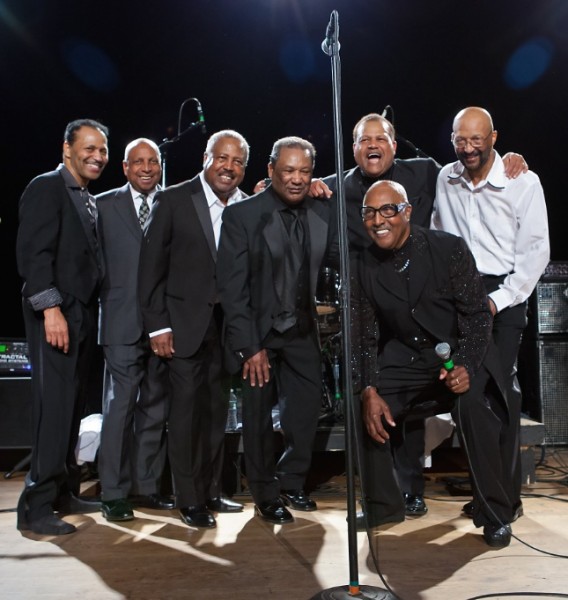
On May 3, 2014, all seven Tavares brothers performed on stage together for the first time in the group’s history (left to right): Butch, John, Pooch, Ralph, Tiny & Victor with Chubby in front.
THE TAVARES DISCOGRAPHY: ORIGINAL RELEASES
by Rick Bellaire
Singles/45s
LINDA & THE DEL RIOS
1962
Come On, Let Me Try b/w I Don’t Want To Be Loved – Not By Him (Crackerjack/Sue 4005)
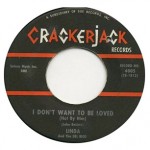
CHUBBY AND THE TURNPIKES
1968
I Know The Inside Story b/w I Didn’t Try (Capitol 5840)
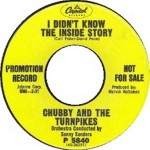
The promo copies for this release mistakenly interpolated the titles of both sides creating one of the rarest Tavares-related collectors items
THE TURNPIKES
1969
Cast A Spell b/w Nothing But Promises (Capitol 2234)
TAVARES
1973
Check It Out b/w The Judgement Day (Capitol 3674)
Non-album B-Side
1974
That’s The Sound that Lonely Makes b/w Little Girl (Capitol 3794)
Too Late b/w Leave It Up To The Lady (Capitol 3882)
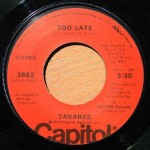
She’s Gone b/w To Love You (Capitol 3957)
Remember What I Told You To Forget b/w My Ship (Capitol 4010)
1975
It Only Takes A Minute b/w I Hope She Chooses Me (Capitol 4111)
Free Ride b/w In the Eyes Of Love (Capitol 4184)
1976
The Love I Never Had b/w In The City (Capitol 4221)
Heaven Must Be Missing An Angel Part 1 b/w Part 2 (Capitol 4270)
Don’t Take Away The Music b/w Guiding Star (Capitol 4348)
1977
Whodunit b/w Fool Of the Year (Capitol 4398)
Goodnight My Love b/w Watchin’ The Woman’s Movement (Capitol 4453)
More Than A Woman b/w We’re Both Ready For Love (Capitol 4500)
1978
The Ghost Of Love Part 1 b/w Part 2 (Capitol 4544)
Timber b/w Feel So Good (Capitol 4583)
Never Had A Love Like This Before b/w Positive Forces (Capitol 4658)
1979
Straight From The Heart b/w Let Me Heal The Bruises (Capitol 4703)
Bad Times b/w Got To Have Your Love (Capitol 4811)
1980
I Can’t Go On Living Without You b/w Why Can’t We Fall In Love (Capitol 4846)
I Don’t Want You Anymore b/w Paradise (Capitol 4880)
Love Uprising b/w Hot Love (Capitol 4933)
1981
Break Down For Love b/w Loneliness (Capitol 4969)
Turn Out The Nightlight b/w House Of Music (Capitol 5019)
Loveline b/w Right On Time (Capitol 5043)
1982
A Penny For Your Thoughts b/w The Skin You’re In (RCA 13292)
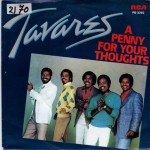 Got To Find My Way Back To You
Got To Find My Way Back To You
b/w I Hope You’ll Be Very Unhappy Without Me (RCA 13433)
1983
Deeper In Love b/w I Really Miss You Baby (RCA 13611)
Words And Music b/w Us And Love, We Go Together (RCA 13684)
EPs/12″ Dance Singles
1975
It Only Takes A Minute (Capitol DISCO-8171)
1976
Heaven Must Be Missing An Angel (Capitol DISCO-8382)
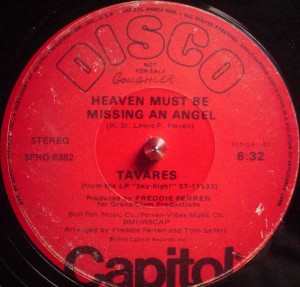 Don’t Take Away The Music (Capitol DISCO-8500)
Don’t Take Away The Music (Capitol DISCO-8500)
1977
Never Had A Love Like This Before (Capitol DISCO-S-95388
1978
Timber (Capitol SPRO-8853)
Promo-only 12″
1979
Straight From The Heart (Capitol DISCO-SPRO-9087)
Promo-only 12″
1982
Got To Find My Way Back To You (RCA Victor PD-13434)
1983
Deeper In Love b/w I Really Miss You Baby (RCA Victor PD-13612)
1987
C’est La Vie – Tavares ’87 4 Song EP (JDC/Domain Record Company JDC/DOM-002)
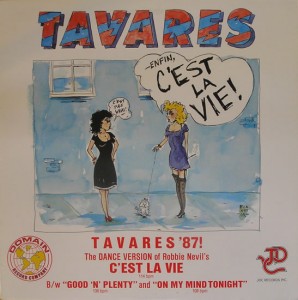
This dance version of Robbie Nevil’s huge hit was a European success for the group with their first independent release
C’est La Vie (Dance Version)
C’est La Vie (Radio Version
Good ‘n’ Plenty
On My Mind Tonight
Produced by Brian Panella, Gene Page & Jon Gilutin
1988
She Freaks Out On The Floor (JDC/Domain Record Company – JDC/DOM 003)
Produced by Brian Panella
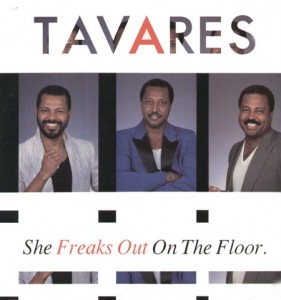
Dance single featuring Pooch, Butch and Chubby. It was a nationwide dance floor smash in the late 1980s
Albums/LPs
1974
Check It Out (Capitol ST-11258)
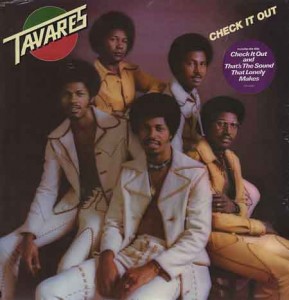 If That’s the Way You Want It
If That’s the Way You Want It
Strangers in Dark Corners
That’s the Sound That Lonely Makes
Check It Out*
Wish You Were With Me Mary
I’ll Never Say Never Again
Little Girl
Let’s Make the Best of What We Got
I’m in Love
Mama’s Little Girl
Produced by Johnny Bristol, Robert Bowles*
2 – Hard Core Poetry (Capitol ST-11316)
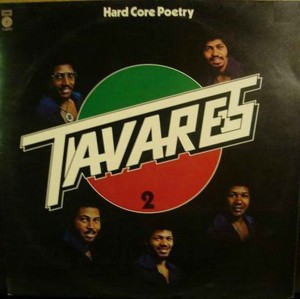
Someone To Go Home To
She’s Gone
My Ship
Leave It Up To The Lady
To Love You
Too Late
Remember What I Told You To Forget
What You Don’t Know
Hard Core Poetry
Produced by Dennis Lambert & Brian Potter
1975
In The City (Capitol ST-11396)
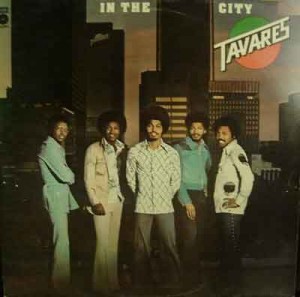
It Only Takes A Minute
Fool’s Hall Of Fame
The Love I Never Had
Nothing You Can Do
In The Eyes Of Love
Ready, Willing And Able
We Fit To A Tee
Free Ride
I Hope She Chooses Me
In The City
Produced by Dennis Lambert & Brian Potter
1976
Sky High! (Capitol ST-11533)
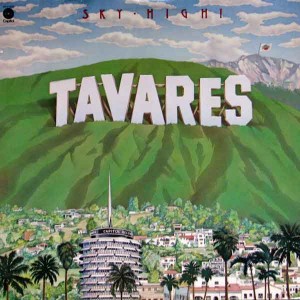
The Mighty Power Of Love
Ridin’ High
To The Other Man
Heaven Must Be Missing An Angel
Bein’ With You
Wonderful
Guiding Star
Don’t Take Away The Music
Produced by Freddie Perren
1977
5 – Love Storm (Capitol ST-11628)
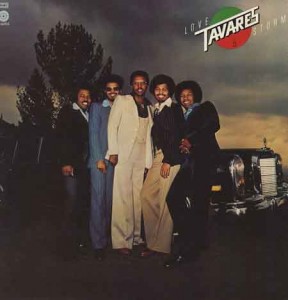
Whodunit
Keep In Touch
I Wanna See You Soon (with guest vocalist Freda Payne)
Fool Of The Year
Watchin’ The Woman’s Movement
One Step Away
Out Of The Picture
The Goung Ups & The Coming Downs
Goodnight My Love, Pleasant Dreams
Produced by Freddie Perren
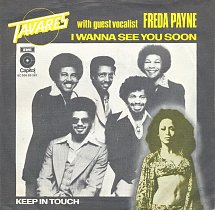
Although not released as a single in the U.S., this track from “Love Storm” with guest vocals by the great Freda Payne (“Band of Gold”) was released on 45 in the U.K. and the Netherlands and remains a favorite with European audiences
Saturday Night Fever: Original Movie Sound Track (RSO 2658-123)
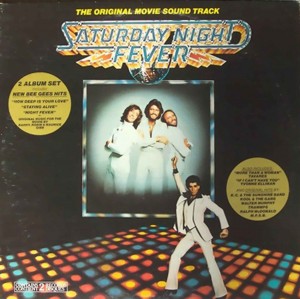
includes one track by Tavares
More Than A Woman
Produced by Freddie Perren
The Best Of Tavares (Capitol ST-11701)
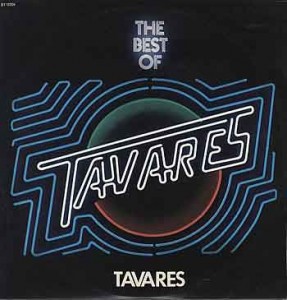
Heaven Must Be Missing An Angel
She’s Gone
Mighty Power Of Love
Check It Out
One Step Away
I Wanna See You Soon
Whodunit (Who Done It?)
Bein’ With You
It Only Takes A Minute
The Love I Never Had
My Ship
Don’t Take Away The Music
Various producers
1978
6 – Future Bound (Capitol SW-11719)
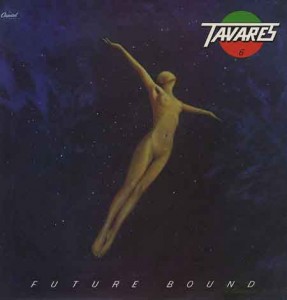
The Ghosts Of Love
Timber
We’re Both Ready For Love
All I See Is You
Slow Train To Paradise
Honey Can I
More Than A Woman
Feel So Good
Produced by Freddie Perren
1979
8 – Madam Butterfly (Capitol SW-11874)
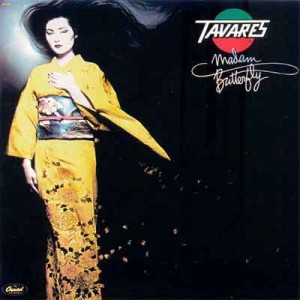
Straight From Your Heart
Games, Games
Madam Butterfly
Let Me Heal the Bruises
Never Had a Love Like This Before
One Telephone Call Away
My Love Calls
Positive Forces
I’m Back for More
Produced by Bobby Martin
1980
9 – Supercharged (Capitol ST-12026)
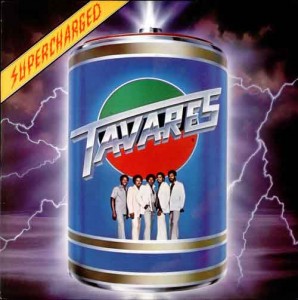
Bad Times
We Both Tried
Can’t Get Enough
Why Can’t We Fall In Love
I Just Can’t Go On Living Without You
I Don’t Want You Anymore
Paradise
Got To Have Your Love
Produced by David Foster, Benjamin Wright, Bobby Colomby
10 – Love Uprising (Capitol ST-12117)
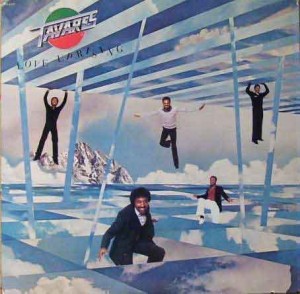
Only One I Need to Love
Break Down for Love
Love Uprising
Loneliness
Knock the Wall Down
Hot Love
Don’t Wanna Say Goodnight
Do You Believe in Love
She Can Wait Forever
In This Lovely World
Life Time Of Love
Produced by Benjamin Wright
1981
Loveline (Capitol 12167)
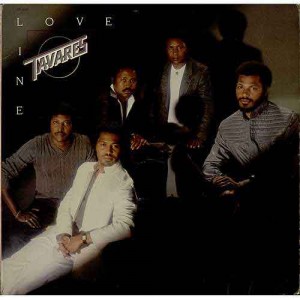
Keep On
Turn Out The Nightlight
Better Love
God Bless You
Touche
Loveline
Don’t Want To Fool You
House Of Music
Right Back In Your Arms Again
Right On Time
Produced by Alan Abrahams
1982
New Directions (RCA AFL1-4357)
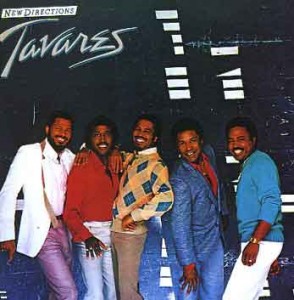
A Penny For Your Thoughts
I Hope You’ll Be Very Unhappy Without Me
Mystery Lady
Abra-Ca-Dabra Love You Too
Got To Find My Way Back To You
Maybe We’ll Fall In Love Again
The Skin You’re In
Wanna Be Close To You
Produced by Jay Senter & Kenny Nolan, Benjamin Wright and Ric Wyatt, Jr.
1983
Words And Music (RCA AFL1-4700)
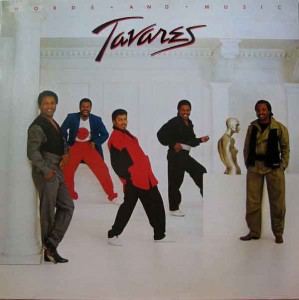
Ten To One
Deeper In Love
Caught Short
(You’re) My All In All
Words And Music
Baby I Want You Back
I Really Miss You Baby
Don’t Play So Hard To Get
Us And Love (We Go Together)
Produced by Leon Sylvers III, Dana Meyers, Wardell Potts Jr., Jay Senter, Kenny Nolan, Rick Wyatt Jr.
1997
Tavares Live (Waxworks Records 507926)
Bad Times
Never Had A Love Like This Before
I Hope You’ll Be Very Unhappy Without Me
You Are The Words
Don’t Take Away The Music
She’s Gone
It Only Takes A Minute
Remember What I Told You To Forget
Whodunnit
Check It Out
Turn Your Love Around
More Than A Woman
Heaven Must Be Missing An Angel
Produced by The D.I.R. Radio Network
Don’t be fooled by the shoddy packaging – this is one great album and captures the group at its peak performing most of their hits up to that point. Recorded live at The Roxy in Hollywood, California on July 10, 1977, half the material was broadcast on the syndicated radio show The King Biscuit Flower Hour in the fall of that year. This album, which includes the entire performance, first surfaced in 1997 when King Buiscuit began licensing their live archives for issue on CD to various independent companies. It has been reissued at least six times with different covers, but as long as the CD reads “live” on the cover, you’ll be getting this show. It is also available for download on Concert Vault, a division of Wolfgang’s Vault, the company which handles the Bill Graham archives.
1994
The Best of Tavares Revisited (UniDisc SPLK-7192)
Strangers in Dark Corners
Goodnight My Love (Pleasant Dreams)
Remember What I Told You to Forget
A Penny for Your Thoughts
Check It Out
When I Need You
The Love I Never Had
She’s Gone
Whodunit
Too Late
Just an Illusion
More Than a Woman – (12″ Mix)
Heaven Must Be Missing an Angel
It Only Takes a Minute
Dont Take Away the Music
My Ship
Produced by Eric Mathew, Daryl Payne, Robert Matichak, Gino Crescenza, Maurizio Nall & Tavares
Not just re-makes, this album is more of a reimagining of the group’s classic material. Excellent new look at their greatest hits.
SOLO AND RELATED RECORDINGS
VICTOR TAVARES
Singles
1981
Come Into The Heartbeat b/w First House On The Right (Polydor 12-PRO-151)
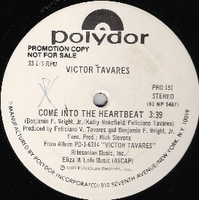 So Good b/w Then You Can Tell Me Goodbye (Polydor PD-2174)
So Good b/w Then You Can Tell Me Goodbye (Polydor PD-2174)
1983
Show Me b/w Show Me – Instrumental (Malaco MAL-120010)
1981
Album
Victor Tavares (Polydor LP-2391)
Come Into The Heartbeat
So Good
Going Through The Motions Of Love
Solid Gold
First House On The Right Side
Once You’ve Gone With Your Mind
Good Good Lovin’
Then You Can Tell Me Goodbye
Produced by Benjamin Wright & Feliciano Tavares
CHUBBY TAVARES
2011
Single
It’s Christmas (Chubby Tavares Music)
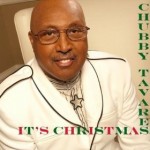
2012
Album
Jealousy (Fuel 2000 191929)
My Foolish Heart
Jealousy
Please Tell Me Why
I Can’t Tell You Why
Words of a Fool
They Say I’ts Deja Vu
Daddy’s Home
Flee The City
It’s All In the Game
I Believe in Magic
Produced by Carla Olson
TINY TAVARES
Album
2007
Disco Classics (Essential Media Group 112992)
 It Only Takes A Minute
It Only Takes A Minute
Heaven Must Be Missing An Angel
More Than A Woman
Don’t Take Away The Music
Check It Out
It Only Takes A Minute
Heaven Must Be Missing An Angel
More Than A Woman
Produced by Tiny Tavares
Dance Single (CD & 12″ Vinyl)
2008
Heaven Must Be Missing An Angel (Essential Music Group 124162)
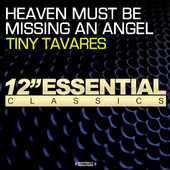 Heaven Must Be Missing An Angel (Da Mooch’s More Than A Remix)
Heaven Must Be Missing An Angel (Da Mooch’s More Than A Remix)
Heaven Must Be Missing An Angel (Instrumental)
Heaven Must Be Missing An Angel (Acappella)
RALPH & TINY TAVARES
Album
2005
The It’s Possible Team (5am Deep 5637332260)
It Only Takes An Inning, Girl (To Beat The Yanks)
Game Seven
Ralph briefly came out of retirement to join his brother Tiny for two tracks on this charity CD honoring the 2004 Red Sox world championship for the benefit of the New England based charity Save Our School Sports Program. The two tracks are “Sox-ified” versions of two of their biggest hits, “It Only Takes A Minute” and “Heaven Must Be Missing An Angel”
TAVARES RESOURCES
BOOKS
Robert “Boogie” Bowles, How I Became Guitarist For A Motown Legend
Xlibris Publishing ©2011
Quinn Harris, The Quinn Harris Story: From Funky Blues To Good News
AuthorHouse Pubishing ©2011
The autobiographies of the groups first producer and first musical director each offer amazing details and personal tales of the group’s early days from the first Capitol Records contract as Chubby & The Turnpikes to their second Capitol contract and their musical evolution into Tavares
THE OFFICIAL TAVARES WEBSITE
http://www.tavaresbrothers.com/
CAPE VERDEAN HERITAGE MUSEUM
This website has stories not only about the group, but about their biggest musical influences: their dad, Feliciano “Flash” Tavares and their aunt, Vickie Tavares Vieira
http://www.capeverdeanmuseum.org/2006halloffame.html
REMASTERS AND REISSUES: CDs and Downloads
Cherry Red Records, one of the U.K.’s finest reissue companies, has been systematically working on remastering and reissuing all of their original albums complete with associated bonus tracks (B-sides, 12 mixes, etc.) and will soon complete the series putting all of the group’s output back in print. The sound is stunning and, best of all, they are available at affordable, regular U.S. CD prices (around $15.00) through all of the usual online retailers such as Amazon.com and eBay. The bulk of their output is also available for download on the larger sites such as iTunes and Rhapsody.
RECORD COLLECTING
For you vinyl collectors, all of their original records were best-sellers and, therefore, easy to find and generally affordable on collectors sites such as eBay, GEMM and MusicStack.
GETTING STARTED
If you’re new to the music of Tavares and looking for a place to start, we recommend:
The Best Of Tavares (EMI/Capitol Gold 93802)
One CD with 15 of their biggest Capitol tracks, an expansion of the “Best of” LP, or
Tavares: Anthology (Capitol/Right Stuff 93745)
Two CDs at a budget price with ALL the hits plus many album tracks
